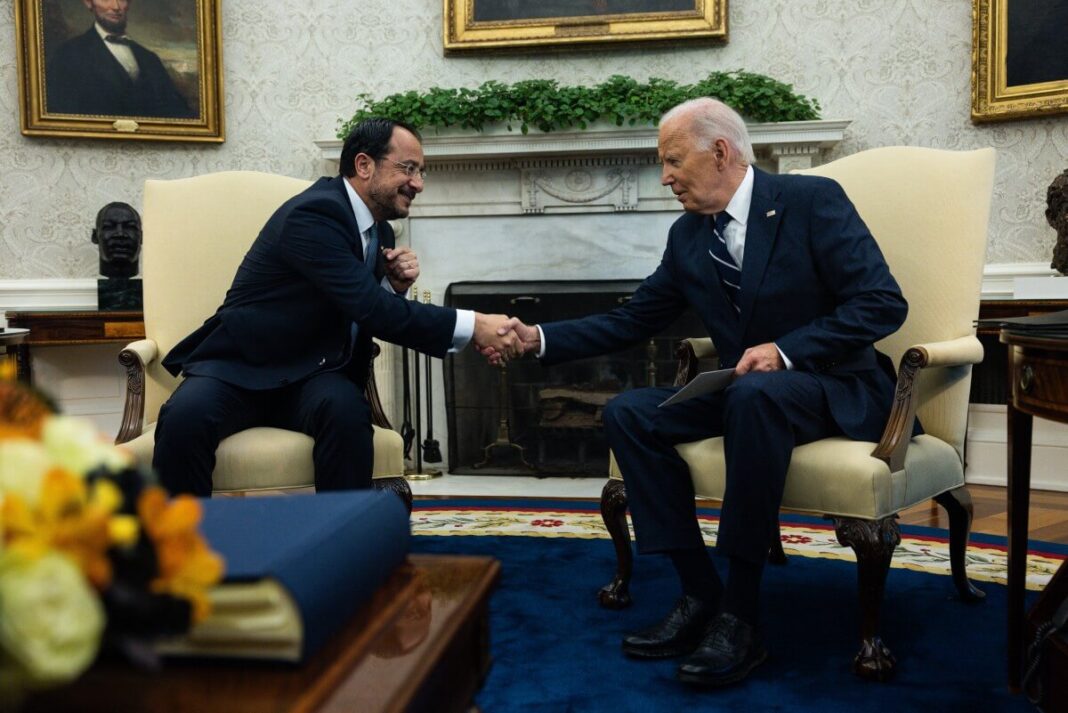Fatih Yurtsever*
A recent visit paid by Greek Cypriot President Nikos Christodoulides to the White House, the first official invitation extended to a Greek Cypriot leader since 1996, is a result of a strengthening relationship between the US and Cyprus amid Turkey’s declining role as a reliable partner, shifting alliances and growing regional tensions in the eastern Mediterranean.
On October 30, Cypriot President Nikos Christodoulides was received by US President Joe Biden for a bilateral meeting at the White House. The last time a Cypriot president met with a US president at the White House was in 1996, when President Glafcos Clerides met with then-US president Bill Clinton.
Before their bilateral meeting, Biden talked about the 50th anniversary of the division of Cyprus, marked this year, describing it as a “sad day” while also expressing optimism for a “reunited Cyprus” through a “bizonal, bicommunal federation.”
He also affirmed the United States’ readiness to back efforts to achieve this goal.
A longstanding dispute
Cyprus has been entrenched in a protracted dispute between Greek Cypriots and Turkish Cypriots, despite multiple diplomatic efforts to reach a comprehensive settlement. The conflict intensified in 1974 after a Greek Cypriot coup aimed at unifying the island with Greece, leading to Turkey’s military intervention as a guarantor to protect Turkish Cypriots. The Turkish Republic of Northern Cyprus (KKTC) was established in 1983; however, it is only recognized by Turkey.
US-Cyprus relations since 2019
Relations between the United States and Cyprus have significantly evolved since 2019, marking a departure from Washington’s earlier approach of maintaining balance between the KKTC, backed by Turkey, and the Greek Cypriot south. Key developments in this partnership include:
- Lifting of the arms embargo: In September 2022 the United States lifted a decades-long arms embargo on Cyprus, in place since 1987. Cyprus now has access to US defense equipment on the condition that it adheres to anti-money laundering regulations and denies Russian military vessels access to its ports. The waiver is subject to annual review based on Cyprus’s compliance.
- Eastern Mediterranean Security and Energy Partnership Act: Passed in 2019, this act recognized Greece and Cyprus as strategic US partners in the eastern Mediterranean. Aimed at countering Russian influence and securing regional energy resources, the act has reinforced Cyprus’s position in US foreign policy.
- Enhanced defense cooperation: Cyprus joined US military training programs in 2020, strengthening defense collaboration and providing training opportunities for Cypriot military personnel.
- Joint military exercises: Joint US-Cyprus military exercises have become a regular occurrence in recent years, furthering defense ties and impacting the region’s power dynamics.
A growing rift in US-Turkey relations
The closer US-Cyprus alignment is occurring as US-Turkey relations face increasing strain, former Turkish diplomat and foreign policy expert Ömer Murat told Turkish Minute. He cited Turkey’s controversial purchase of the Russian S-400 missile defense system, viewed as incompatible with NATO infrastructure, as a primary friction point, leading to Turkey’s exclusion from the F-35 fighter jet program.
Murat also noted that Turkish President Recep Tayyip Erdoğan’s long opposition to NATO’s expansion, and obstructing the membership of Sweden and Finland for months, has added to Turkey’s isolation within the alliance in addition to his threat to close US military bases in İncirlik and Kürecik in southern and eastern Turkey. These bases play a strategic role in NATO’s regional security, and Erdoğan’s threats have raised further doubts in Washington about Turkey’s reliability as a NATO ally, according to Murat.
Another contentious issue is US cooperation with the People’s Protection Units (YPG) in Syria, a Kurdish militia that Turkey considers an affiliate of the outlawed Kurdistan Workers’ Party (PKK), a group designated as a terrorist organization by both the US and Turkey. However, the US views the YPG as an important partner in its campaign against the Islamic State in Iraq and the Levant (ISIL), further complicating relations with Ankara.
Diminished influence?
Christodoulides’s White House visit stands in stark contrast to Erdoğan’s absence from the US capital during Biden’s administration. Murat interprets this as a sign of Turkey’s waning influence in Washington. “While Erdoğan has yet to set foot in the White House during Biden’s term, Cyprus’s president received a formal welcome, underscoring Turkey’s decreasing standing with the US,” he explained.
Erdoğan was twice hosted at the White House by former president and President-elect Donald Trump during his first term, but has never been received there by current President Joe Biden. The one scheduled visit was postponed.
Historically, Turkey has maintained “red lines” in its US relations, especially concerning recognition of the mass killing of Armenians in the final years of the Ottoman Empire as “genocide,” the divided island of Cyprus and US support for Kurdish militant groups in Syria and Iraq. However, the Biden administration’s recognition of the mass killing of the Armenians as “genocide” and the US’s continued cooperation with the YPG have tested these boundaries. While Turkey still engages with the US on various fronts, including efforts to procure F-16s following its exclusion from the F-35 program, Murat suggests that its “red lines” appear increasingly flexible.
“Turkey’s ‘red lines’ now appear somewhat flexible. This evolving stance may have encouraged the US to further test these boundaries in its eastern Mediterranean policy,” he said.
With this historic visit, the United States has reaffirmed its shifting stance in the eastern Mediterranean, marking a notable development in its regional strategy and highlighting the implications of Turkey’s recent actions on its alliances.
The United States’ long-term strategy in the eastern Mediterranean and Middle East continues to view cooperation with Cyprus as a key pillar, regardless of who occupies the White House. While the return of Trump to the presidency may not dramatically alter this fundamental approach, it could affect the pace and intensity of US engagement on the Cyprus issue.
* Fatih Yurtsever is a former naval officer in the Turkish Armed Forces. He uses a pseudonym due to security concerns.
